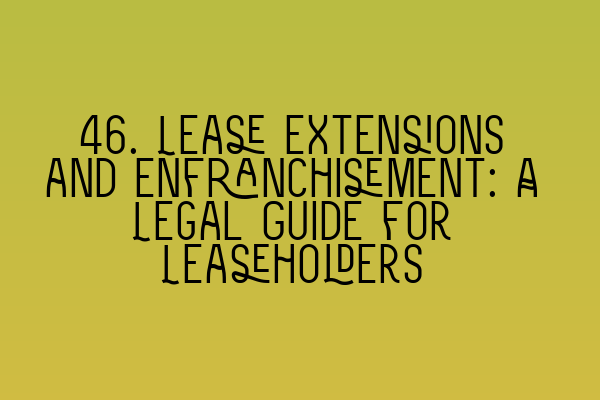46. Lease Extensions and Enfranchisement: A Legal Guide for Leaseholders
Welcome to SQE Property Law & Land Law’s blog post on lease extensions and enfranchisement! If you’re a leaseholder looking to extend your lease or exercise your right to enfranchisement, you’ve come to the right place. In this comprehensive guide, we will provide you with a clear understanding of the legal process and your rights as a leaseholder.
Before we dive into the details, let’s define lease extensions and enfranchisement. A lease extension refers to the process of extending the lease term of a property beyond its original expiration date. On the other hand, enfranchisement is the right of leaseholders to collectively purchase the freehold of their building.
Now that we have a basic understanding, let’s explore the steps involved in lease extensions and enfranchisement:
1. Understanding the Lease Term: The first step is to review your lease agreement to determine its current term and remaining years. Most leaseholders become eligible to extend their lease once they have owned the property for two years or more.
2. Valuation: Once you have decided to extend your lease or exercise your right to enfranchisement, it is crucial to determine the value of the lease or freehold. It is highly recommended to seek professional advice from a qualified valuer who specializes in lease extensions and enfranchisement.
3. Statutory Route vs. Informal Negotiations: Leaseholders have the option to pursue either the statutory route or engage in informal negotiations with the freeholder. The statutory route provides a clear framework for extending a lease or enfranchising a property, ensuring that you are protected by law. On the other hand, informal negotiations may offer flexibility but may also result in prolonged and uncertain outcomes.
4. Serving Notice: If you decide to proceed with the statutory route, you will need to serve a formal notice on the freeholder or landlord, outlining your intention to extend the lease or enfranchise the property. This notice must meet several legal requirements and timelines, so it is crucial to seek professional legal advice to ensure compliance.
5. Negotiations and Counter-Notices: Following the service of notice, negotiations will take place between the leaseholder and the freeholder. The freeholder may respond with a counter-notice, which will set out the terms on which they are willing to extend the lease or sell the freehold. This is an important phase, and it is advisable to engage an experienced solicitor who specializes in lease extensions and enfranchisement to represent your interests during negotiations.
6. Valuation Tribunal or Court Proceedings: If an agreement cannot be reached through negotiations, either party can refer the matter to a Valuation Tribunal or court. These independent bodies will assess the various factors and determine a fair price for the lease extension or freehold purchase.
7. Completing the Transaction: Once a price has been agreed upon, it is time to complete the transaction. This typically involves the exchange of legal documentation, payment of the agreed amount, and registration of the lease extension or freehold transfer with the Land Registry.
By following these steps and seeking professional advice throughout the process, leaseholders can ensure a smooth and successful lease extension or enfranchisement.
At SQE Property Law & Land Law, we have a team of expert solicitors who specialize in lease extensions and enfranchisement. Our extensive experience and in-depth knowledge of property law allow us to guide our clients through the complex legal process with ease.
If you’re looking for practice exam questions or mock exams to prepare for your SQE exams, we recommend checking out our related articles on SQE 1 Practice Exam Questions and SQE 1 Practice Mocks FLK1 FLK2. These resources will provide you with valuable practice to enhance your understanding and boost your exam performance.
For those preparing for SQE 2, we also offer comprehensive SQE 2 Preparation Courses. These courses are designed to equip you with the necessary skills and knowledge to excel in your SQE 2 exams.
For all your SQE 1 and SQE 2 exam dates and other important information, refer to our article on SRA SQE Exam Dates. Stay informed and plan your study schedule accordingly.
Are you ready to take the next step and secure your lease extension or enfranchisement? Contact SQE Property Law & Land Law today for expert legal advice and representation. Our team is dedicated to helping leaseholders achieve their desired outcomes.
Disclaimer: This blog post is for information purposes only and should not be considered as legal advice. It is always recommended to seek professional legal advice tailored to your specific circumstances.
[i] SQE 1 Practice Exam Questions – https://fqps.co.uk/sqe/sqe1-preparation/mcq-practice-quiz
[ii] SQE 1 Practice Mocks FLK1 FLK2 – https://fqps.co.uk/sqe/sqe1-preparation/practice-mocks-quiz
[iii] SQE 2 Preparation Courses – https://fqps.co.uk/sqe/sqe2-preparation
[iv] SQE 1 Preparation Courses – https://fqps.co.uk/sqe/sqe1-preparation
[v] SRA SQE Exam Dates – https://fqps.co.uk/sqe/sqe1-sqe2-exam-dates
